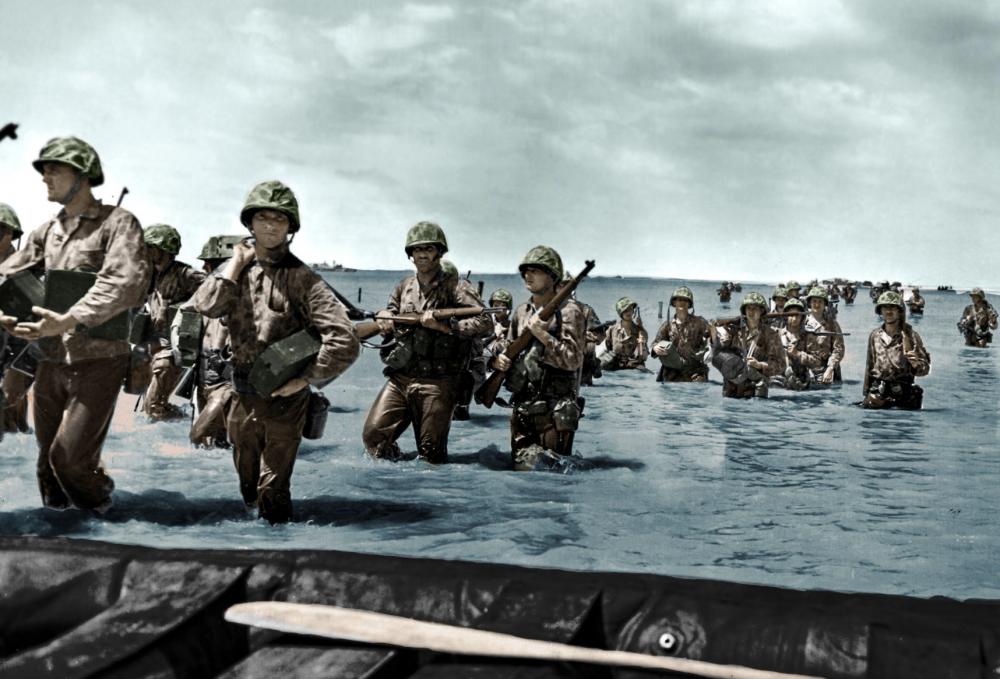I’ve walked the bluff-framed beach twice. I’ve noted its serenity. The tranquility is jarring.
I’ve looked up at the bluffs and marveled at their majesty, as well as the fatal weapons fire that once emanated from them.
I’ve somberly walked the American cemetery atop the bluffs and viewed the more than 9,300 marble crosses and Stars of David situated in a beautifully manicured setting.
The violence of yesteryear permeates my conscience. I am dumbstruck by the shear bravery exhibited during an amphibious invasion such as the world had never witnessed.
In two days, on June 6, the 75th anniversary of the D-Day assault in Normandy, France will dominate worldwide media attention. It will describe the incredible effort of the Allied forces to break the grip on Europe of Germany’s Nazi regime and its soulless leader, Adolf Hitler.
My focus today is entirely on Omaha Beach (Vierville-sur-Mer), the segment of shoreline that involved thousands of Marylanders in the 29th Infantry Division (Blue and Gray), including citizen-soldiers with roots on the Eastern Shore. Most are dead now.
The number killed, missing or wounded in the 29th Division from ferocious combat on June 6, 1944 was 1,272, including 1,007 in the 116th Infantry Regiment. This unit, primarily comprising former members of the Virginia National Guard, was part of the first wave. Many either didn’t reach the beach or died under the onslaught of horrific gunfire showered upon them by German forces occupying the bluffs.
Though the initial assault and its deadly consequences prompted skepticism from the generals about the eventual success of this crucial invasion, Joe Balkoski, a historian who has written several books about the Normandy combat, drew this conclusion from his extensive research, as noted in Omaha D-Day Beach:
“That the GIs on Omaha Beach did indeed possess the essential fighting skills to save the day has become an elemental moral of American history. No one realized it at the time, particularly the unfortunate men who were subjected to the enemy’s relentless barrage of bullets and shells, but Omaha Beach would become one of those exceptional moments in history when Americans defined themselves by their actions as a people worthy of the principles upon which the nation was founded.”
In 1994, I served as escort officer for Gov. William Donald Schaefer during the 50th anniversary of D-Day. He was the only governor who attended the ceremonies. During World War II, he served as an Army hospital administrator in England, where he saw the personal destruction imposed on D-Day soldiers lucky enough to escape the killing fields, though seriously wounded.
I met a Dr. Harold Baumgartner from Jacksonville, FL during the 50th anniversary activities. Landing in the first wave on Omaha Beach, he was wounded five times in just 32 hours of combat. He told me that his wartime experience motivated him as a doctor to accept whatever a patient could afford, whether it was money or farm commodities. He was determined to pay back for his survival when death was so close to reality.
A truly touching event occurred in St. Lo, a French city and critical transportation hub that prompted a 44-day struggle for dominance by the Allied forces. On a beautiful day in a city where shop owners displayed signs welcoming the “liberators,” 29th Infantry Division veterans, many in their late 70s and early 80s, walked down a major street holding the hands of school children grasping flowers.
Some of the men cried.
Emotional reactions by World War II veterans often bordered on the stoic. Hardened by the Depression in the 1930s and further stiffened by horrific wartime experiences, these men rarely cried in front of family members. Though burdened by memories of lost buddies, they kept their emotions bottled up.
Family members accompanying their fathers and grandfathers saw heartfelt tears for the first time.
In two days when the media reports of soaring language used by public officials at times like this, I believe that the enormity of the D-Day invasion, its human toll and its importance in leading to the eventual defeat of a stubborn enemy led by a crazed dictator should be front and center. The deadly fighting that occurred on a French beach that now seems so peaceful was unforgettable.
War with its set-piece battles had a different face in the 1930s and 1940s than our current acts of random terrorism. Its consequences threatened the stability of the Free World.
Our soldiers turned the tide.
Columnist Howard Freedlander retired in 2011 as Deputy State Treasurer of the State of Maryland. Previously, he was the executive officer of the Maryland National Guard. He also served as community editor for Chesapeake Publishing, lastly at the Queen Anne’s Record-Observer. In retirement, Howard serves on the boards of several non-profits on the Eastern Shore, Annapolis and Philadelphia.



Patti Willis says
Howard:
Well and beautifully said.